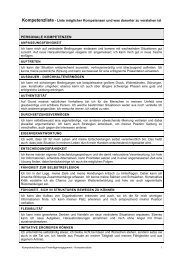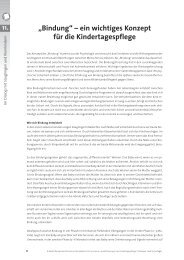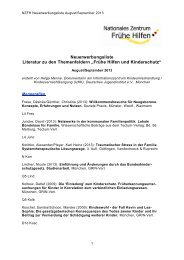download - Deutsches Jugendinstitut e.V.
download - Deutsches Jugendinstitut e.V.
download - Deutsches Jugendinstitut e.V.
Create successful ePaper yourself
Turn your PDF publications into a flip-book with our unique Google optimized e-Paper software.
On the basis of local data, areas were identified in these countries which displayed<br />
specific structural and infrastructural deficits and also those of a social and educational<br />
nature, necessitating special political attention and support. The criteria for the<br />
classification of these areas differed according to the availability of detailed data collected<br />
on a small scale. In all cases, it was clear that highly specific strategies would have to be<br />
developed to have any effect in these areas.<br />
A glance through individual programmes within these strategies shows that a certain<br />
degree of flexibility was necessary in the implementation of these strategies. The Children’s<br />
Fund in Great Britain for example took action on a municipal level and allocated target<br />
groups eligible for support according to local needs. These target groups did not necessarily<br />
have to originate from a disadvantaged urban area, but merely had to fulfil the criteria of<br />
neediness. This avoided disadvantaged children from outside the specified urban areas<br />
from being systematically excluded from support.<br />
This example shows that although an orientation towards social areas with special needs<br />
is crucial and necessary, it is also vital not to lose sight of disadvantaged persons outside<br />
these areas. Socio-spatial strategies must not be developed on a strict geographic basis, but<br />
must additionally target the social reference point of disadvantaged young persons.<br />
Analysis of countries with stronger departmental-oriented<br />
strategies<br />
The welfare state structure in countries with stronger departmental-oriented strategies is<br />
primarily due to the common socialist history and can be categorised under so-called exsocialist<br />
welfare regimes (cf. Holtmann 2006). Due to this socialist history, these structures<br />
in Eastern European countries possess a strongly authoritarian-paternalistic character. The<br />
state promised comprehensive social care “from the cradle to the grave” and provided the<br />
population with the feeling complete security. State welfare in the socialist period was<br />
based on three fundamental pillars: the “right to work”, comprehensive social service<br />
programmes and a state guarantee for stable consumer prices (cf. Götting/Lessenich 1998).<br />
State enterprises in the paternalistic state welfare system acted as comprehensive socialpolitical<br />
agencies guaranteeing health care, providing child care, allocating housing,<br />
organising recuperative vacations and providing professional training and further training<br />
etc. (Ferge 1979: 118ff., Offe 1994: 112f.).<br />
The ‘transformation’ in Eastern Europe beginning in 1989 was accompanied by a<br />
reorientation process towards control through the market economy. During this process,<br />
the necessity for differentiated social politics was recognised. The institutional<br />
reconstruction, as David Stark (1995) formulated in the case of Eastern Europe, was<br />
essentially a ‘bricolage’ of old and new and neither a realisation of concepts created in a<br />
bureaucratic ivory tower nor the faithful copy of Western models. For this reason, the<br />
following welfare categorisation of countries still on the search for the right path should<br />
only be seen as an initial attempt.<br />
Both the Czech Republic and Hungary can be categorised under a more conservative<br />
welfare state type in which the social security institutions are developed along German-<br />
Austrian lines. Poland is pursuing a more liberal interpretation of the social state and<br />
115

















